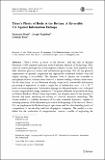Files in this item
There’s plenty of Boole at the bottom : a reversible CA against information entropy
Item metadata
| dc.contributor.author | Berto, Francesco | |
| dc.contributor.author | Tagliabue, Jacopo | |
| dc.contributor.author | Rossi, Gabriele | |
| dc.date.accessioned | 2018-09-04T11:30:08Z | |
| dc.date.available | 2018-09-04T11:30:08Z | |
| dc.date.issued | 2016-12 | |
| dc.identifier | 255688991 | |
| dc.identifier | 21547935-cc65-44ef-b6bc-542040afe755 | |
| dc.identifier | 84990852223 | |
| dc.identifier.citation | Berto , F , Tagliabue , J & Rossi , G 2016 , ' There’s plenty of Boole at the bottom : a reversible CA against information entropy ' , Minds and Machines , vol. 26 , no. 4 , pp. 341-357 . https://doi.org/10.1007/s11023-016-9401-6 | en |
| dc.identifier.issn | 0924-6495 | |
| dc.identifier.other | ORCID: /0000-0003-3246-657X/work/48132017 | |
| dc.identifier.uri | https://hdl.handle.net/10023/15960 | |
| dc.description.abstract | “There’s Plenty of Room at the Bottom”, said the title of Richard Feynman’s 1959 seminal conference at the California Institute of Technology. Fifty years on, nanotechnologies have led computer scientists to pay close attention to the links between physical reality and information processing. Not all the physical requirements of optimal computation are captured by traditional models—one still largely missing is reversibility. The dynamic laws of physics are reversible at microphysical level, distinct initial states of a system leading to distinct final states. On the other hand, as von Neumann already conjectured, irreversible information processing is expensive: to erase a single bit of information costs ~3 × 10−21 joules at room temperature. Information entropy is a thermodynamic cost, to be paid in non-computational energy dissipation. This paper addresses the problem drawing on Edward Fredkin’s Finite Nature hypothesis: the ultimate nature of the universe is discrete and finite, satisfying the axioms of classical, atomistic mereology. The chosen model is a cellular automaton (CA) with reversible dynamics, capable of retaining memory of the information present at the beginning of the universe. Such a CA can implement the Boolean logical operations and the other building bricks of computation: it can develop and host all-purpose computers. The model is a candidate for the realization of computational systems, capable of exploiting the resources of the physical world in an efficient way, for they can host logical circuits with negligible internal energy dissipation. | |
| dc.format.extent | 17 | |
| dc.format.extent | 1002225 | |
| dc.language.iso | eng | |
| dc.relation.ispartof | Minds and Machines | en |
| dc.rights | © The Author(s) 2016. Open Access. This article is distributed under the terms of the Creative Commons Attribution 4.0 International License (http://creativecommons.org/licenses/by/4.0/), which permits unrestricted use, distribution, and reproduction in any medium, provided you give appropriate credit to the original author(s) and the source, provide a link to the Creative Commons license, and indicate if changes were made. | en |
| dc.subject | Cellular automata | en |
| dc.subject | Digital physics | en |
| dc.subject | Philosophy of information | en |
| dc.subject | B Philosophy (General) | en |
| dc.subject | QA75 Electronic computers. Computer science | en |
| dc.subject | Philosophy | en |
| dc.subject | Artificial Intelligence | en |
| dc.subject.lcc | B1 | en |
| dc.subject.lcc | QA75 | en |
| dc.title | There’s plenty of Boole at the bottom : a reversible CA against information entropy | en |
| dc.type | Journal article | en |
| dc.contributor.institution | University of St Andrews.Philosophy | en |
| dc.identifier.doi | 10.1007/s11023-016-9401-6 | |
| dc.description.status | Peer reviewed | en |
This item appears in the following Collection(s)
Items in the St Andrews Research Repository are protected by copyright, with all rights reserved, unless otherwise indicated.

